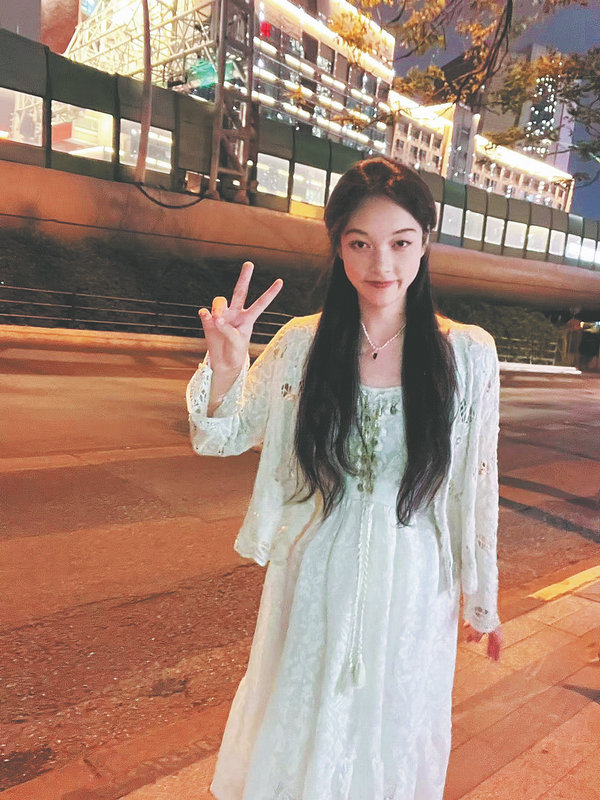
Wu Mengxian. [Photo provided to China Daily]
Wu Mengxian, 20, has set a clearer path for her future career after winning a gold medal at the Statelevel skills contest.
In May, China held its second national rural vitalization skills competition in Guiyang, Guizhou province. It featured 11 events focused on useful and practical skills, including bricklaying, farm machinery maintenance and e-commerce, with more than 700 competitors from across the country vying for victory.
Each event had separate group competitions for experienced workers and students. Wu won gold in the elderly nursing event in the students competition.
Wu, who is in her second year studying nursing at Shanghai Nanhu Vocational and Technical College, attributed her success at the competition to her studies and said they would pave her career as a nursing assistant for the seniors.
"I was hesitant about choosing nursing as my college major at first because I was not sure I would be patient and cautious enough to take care of the patients. But my parents convinced me that the major could win me a stable job in a hospital after graduation," she said.
The competition, however, removed any doubt about her future profession.
"The human touch and heartwarming moments with the elderly are really attractive to me. As far as I know, the elderly nursing sector faces a manpower shortage, and I think it may be an opportunity for us young people to find success."
Wu said she learned about the skills competition during her first year at the college. She decided to participate, and her outstanding performances at trial competitions won her an opportunity to take part in the State-level contest.
"I joined Shanghai's city-level trial selection in March and was in intensive training for a week before the national final competition started," she explained. "The training mainly focused on managing time, becoming proficient in certain operations and boosting communication skills with the elderly," she said.
Wu said the final competition set different scenarios to test competitors' skills and medical knowledge.
"For example, in the 'home service' part, we were required to help an elderly male patient cough up phlegm by correctly patting his back, and then we had to help him eat a meal. Under this scenario, we competitors also had to teach his wife to learn how to pat his back correctly. We only had 15 minutes to do all this," she said.
"We were also required to assist seniors with Parkinson's disease in their rehabilitation training, and we had to transfer elderly people from their beds to wheelchairs and have them take their pills under other test scenarios," she said.
She said she once had a negative perception of nursing the elderly, thinking of it as a messy, exhausting job.
"The competition changed me," Wu said. "Acting as a nurse in the hospital means you have to follow more strict operational procedures and orders, while nursing the elderly allows the nurse to make more personal and flexible plans. I can get really heartwarming and positive feedback from working with the elderly, and that touches me deeply."
She said winning the gold was a starting point for her, as she plans to continue her education after graduating next year and eventually work as a nurse for seniors, not only helping them deal with their ailments but also educating them about services.
"I'm from a small village in Henan province," she explained. "Many old people in my hometown have no idea about pensions or nursing services, and they are unwilling to live in nursing houses as they think they are being deserted by their families if they live in such places."
Wu said that she wishes more elderly people in both urban and rural areas would learn about nursing services, which will benefit their personal health and contribute to the nation's rural vitalization efforts.
"I'm very happy that many of the peers I met at the competition have similar career plans. I think the elderly nursing industry needs young people who have more strength and innovative ideas," she added.





